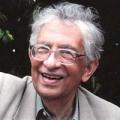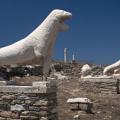42 - Soul Power: Aristotle's De Anima
Posted on
Peter tackles the De Anima (“On the Soul”), focusing on the definition of soul as the form of the body and Aristotle’s theory of sensation.
Themes:
Further Reading
• J. Barnes, M. Schofield, and R. Sorabji (eds), Articles on Aristotle, Vol. 4: Psychology and Aesthetics (London: 1979).
• V. Caston, "Aristotle on Consciousness," Mind 111 (2002), 751-815.
• M. Durrant (ed.), Aristotle’s De Anima in Focus (London: 1993).
• S. Everson, Aristotle on Perception (Oxford: 1997).
• R. Heinaman, "Aristotle and the Mind-Body Problem," Phronesis 35 (1990), 83–102.
• M.C. Nussbaum and A.O. Rorty (eds), Essays on Aristotle’s De Anima (Oxford: 1992).
• C. Shields, "Soul and Body in Aristotle," Oxford Studies in Ancient Philosophy 6 (1988), 103–37.

Aristotle


 ..
..



Comments
souled out?
I don't quite understand ... if the soul just *is* a set of potentialities, is it just another name for the total collection of potentialities? in which case it has no independent existence.
or is it meant to *explain* a set of potentialities, in which case it's presumably something separate from them. also, if it's meant to explain them, does Aristotle offer any detail of the explanation? as in a causal explanation?
finally, if objects have various potentials, does Aristotle discuss whether these are actualised by outside forces e.g. the potential of the water to get hot is actualised by dropping a hot rock into it. or are they actualised by internal forces e.g. the potential of a wasp to sting is actualised by the wasp perceiving a threat ... (there are problems here I suppose of distinguishing internal from external 'triggers') ...
In reply to souled out? by peter l
Soul
I'm amazed this is the first comment on this episode! It's been up for quite a while.
Anyway, good questions! I'll take the second one first since it's easier. Plato (in the Phadrus and Laws) had argued that soul is a self-moving thing, and Aristotle basically agrees with that although with qualifications, since the soul is in a sense moved by the thing that it wants (e.g. the food towards which it moves the body). One difference between living and non-living things, if not the difference, is that living things are capable of self-motion.
The first question is harder. Some people take a more reductive view of Aristotle's theory: the soul is just a collection of powers or faculties. This can be supported by passages in Aristotle, like when he says that sight is like the soul of the eye. And then you're right, this implies that soul can't exist independently. I would say this is Aristotle's view.
However other interpreters, especially in later antiquity and the medieval period, thought that Aristotle made an exception at least for intellection, since intellect has no bodily organ. This might be taken to imply that the soul can go on living without the body, but all it would ever be able to do is think (it never needed the body to do this in the first place).
In reply to Soul by Peter Adamson
Thanks
Just wanted to thank you for your work Prof. Adamson. Really a landmark in finding the common ground between unabashed academic/nerd energy and accessibility for those of us who haven't seen the inside of a classroom in a long time. Best.
In reply to Thanks by Jake
Energy
"Academic/nerd energy" - I should put that on a t-shirt! Thanks, I'm glad you are enjoying the series.
Origins
How interesting that Darwin reverts to the idea of beginnings that the early Greek philosphers proposed.
Knowledge & Perception
I really appreciate this podcast. It has been very helpful in my study of Aristotle. However, I have a question I still can't answer. Is thinking and knowing dependent on perception in Aristotle’s view? I have read De Anima, and although the answer was supposed to be in III,8 I was not able to catch it. Could you please explain it to me?
In reply to Knowledge & Perception by Daniele Bocchetti
Perception and knowledge
Hi,
If you want a single text that makes clear that our knowledge depends on perception the best place is actually not in de Anima, but the last chapter of the Posterior Analytics (2.19). The question of how that text and the empirical basis of knowledge relates to the theory of intellect in De Anima is a much debated one - if you listen to later episodes you'll hear that there is a lot of disagreement about this already in late antiquity and the middle ages.
Peter
Types of Soul
So I’m late to the game and just found this podcast last week and I’m just getting to this episode. I listened to your description of the types of souls (plant, animal and human) and was waiting for you to say “now I know what you’re thinking.” But you never did.
Perhaps my thought was outside of the context of this specific episode. Did Aristotle (I’m guessing no) or more likely anyone else ever run with this theory to postulate other types of soul that might occupy the cosmos? Maybe more of a metaphysical question than what is intended by Aristotle’s concept of a soul.
Another thought and framed maybe more within his context and terminology, if the soul is the sum and/or holder of all potentialities that a human can actualize, 1) how much potential is in the human soul that has not yet been actualized and 2) can the type of soul, human, acquire new potentialities that can then be actualized? Can the souls “evolve?”
In reply to Types of Soul by Matt
Soul
Thanks for joining the audience! 42 episodes in a week, that's pretty good going (I eventually stopped saying "I know what you're thinking" entirely because people said it was getting annoying).
Anyway, in the Aristotelian tradition the three types of soul stay constant, just because empirically these are the three types of living things. The exception might be things like angels or the idea that the whole universe has a soul, as proposed by Plato in the Timaeus.
Aristotle would say that the human soul is unchanging in type: all species are eternal and do not evolve, a human soul has the potential it has by nature, and the nature won't change. Besides there is no room for improvement anyway: it is already possible for a human soul to achieve both practical and intellectual virtue and that is full happiness, with nothing left to be desired at least within the bounds of human nature - God is better than we are, he thinks, but we cannot become gods.
In reply to Soul by Peter Adamson
Magnum P.I.
Oh, and I am sorry to hear the madding crowd heckled you out of saying "I know what you're thinking." I thought it was great, in part because it was something Tom Selleck always said in the voice-overs for Magnum P.I.
Add new comment